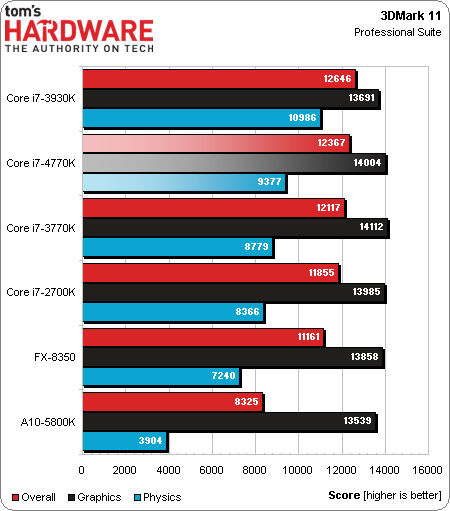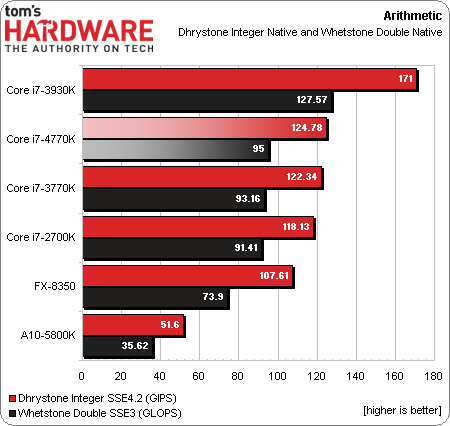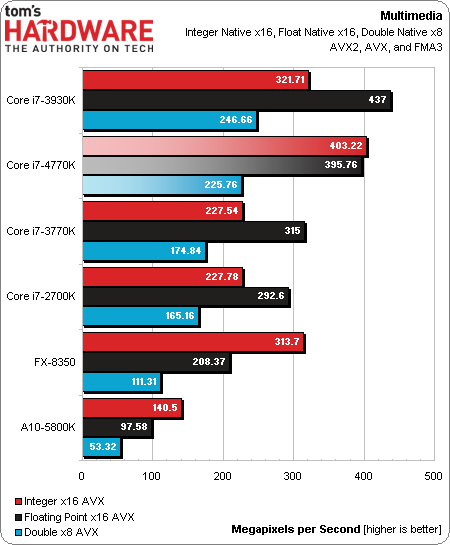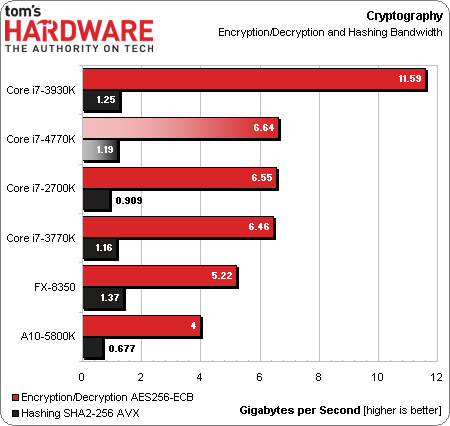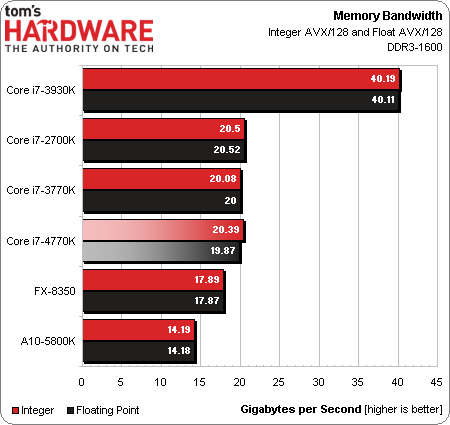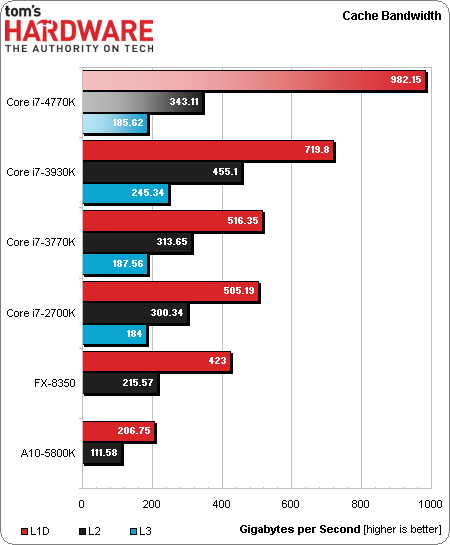The Core i7-4770K Review: Haswell Is Faster; Desktop Enthusiasts Yawn
Intel's Haswell architecture is finally available in the flagship Core i7-4770K processor. Designed to drop into an LGA 1150 interface, does this new quad-core CPU warrant a complete platform replacement, or is your older Sandy Bridge-E system better?
Results: Synthetics
This one’s mainly interesting for the Physics benchmark, a pure measure of CPU performance. Core i7-3930K asserts itself early on, with quad-core Haswell, Ivy Bridge, and Sandy Bridge chips taking the next three spots. In the case of FX-8350 and, to a greater extent, A10-5800K, lower host processor performance brings down the Overall suite score, represented by the red bar.
Back when I published Core i7-4770K: Haswell's Performance, Previewed, a lot of folks (even some from within Intel) tried claiming our sample wasn’t representative of final performance. A quick comparison shows that, while we’re seeing very similar SSE3-based numbers, the Core i7-4770K’s advantage over -3770K is actually smaller in this latest version of Sandra, despite Haswell benefiting from AVX2 support.
Sandra’s Multimedia benchmark generates an image of the Mandelbrot Set fractal using 255 iterations for each pixel, representing vectorised code that runs as close to perfectly parallel as possible.
Our AVX2-based results from Core i7-4770K almost match the preview piece’s exactly, while the AVX-accelerated Ivy and Sandy Bridge numbers are close too. We now see that AVX2 helps a four-core Haswell part outperform Sandy Bridge-E’s six cores in AVX-optimized code.
When it comes to floating-point performance, the AVX code that runs on Core i7-3770K and -2700K matches pretty closely. But -4770K’s FMA3 path isn’t as consistent. Floats are faster, while doubles slow down quite a bit. The scaling is much closer to what we were expecting when we were testing for the preview.
Sandy Bridge-E takes off like a bat out of hell in the Encryption/Decryption module due to the extreme memory bandwidth you’ll see in the next chart, which feeds the CPU cores data quickly.
The low memory bandwidth issues affecting our early motherboard are mostly worked out, and we now see Core i7-4770K delivering competitive throughput in the AES-NI-accelerated workload, along with strong hashing performance.
Get Tom's Hardware's best news and in-depth reviews, straight to your inbox.
These bars could have been predicted based on the AES256 results above, but here they are.
L1D, L2, and L3 cache bandwidth are all up on our Core i7-4770K compared to my preview piece. However, only the L1D yields the doubling of bandwidth we were expecting. Given 64 bytes/cycle (compared to 32 for Ivy Bridge), this number should still be much higher than it is. There’s still no good explanation for that outcome.
-
Danny N Biggest question is if its worth upgrading my cpu i5 750 4.0ghz to Haswell or my gfx card ati 5870 to nvidia 7xx, my main pc use is for Maya, After FX and some fps gaming. Any input would be appriciated cause I'm leaning towards a cpu upgrade atm.Reply -
refillable @Danny NReply
You shouldn't ask here. Perhaps you should get an i7-4770k and a 7970(?) I heard that kepler cards does not perform that good in Maya and Aftereffects (In OpenCL). -
envy14tpe Seriously. What did people expect? Of course it's better but nothing out of the ordinary for Intel.Reply -
enewmen For me it's not about the 10% gain over SB. It's more like a huge gain over a C2Q, floating point performance over SB (should matter later), and lower watts. I hope THG can expand the Power Consumption and Media Encoding later - check the Watts idle more and fast quick-sync media encoding quality loss. My 2 cents..Reply
EDIT:
other sites have reported much lower watts idle, so a lot doesn't make sense or the 4770k has a very slow throttle.
http://hexus.net/tech/reviews/cpu/56005-intel-core-i7-4770k-22nm-haswell/?page=15
http://www.techspot.com/review/679-intel-haswell-core-i7-4770k/page13.html
